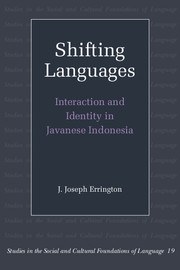Book contents
- Frontmatter
- Contents
- List of figures, maps, and tables
- Acknowledgements
- Preface: suggestions for use
- Note on orthography and transcription
- Map 1 The Indonesian archipelago
- Map 2 Eastern Central Java
- 1 Introduction
- 2 A city, two hamlets, and the state
- 3 Speech styles, hierarchy, and community
- 4 National development, national language
- 5 Public language and authority
- 6 Interactional and referential identities
- 7 Language contact and language salad
- 8 Speech modeling
- 9 Shifting styles and modeling thought
- 10 Javanese–Indonesian code switching
- 11 Shifting perspectives
- Notes
- Works cited
- Index of javanese and indonesian words
- General index
- Titles in the series
5 - Public language and authority
Published online by Cambridge University Press: 01 June 2011
- Frontmatter
- Contents
- List of figures, maps, and tables
- Acknowledgements
- Preface: suggestions for use
- Note on orthography and transcription
- Map 1 The Indonesian archipelago
- Map 2 Eastern Central Java
- 1 Introduction
- 2 A city, two hamlets, and the state
- 3 Speech styles, hierarchy, and community
- 4 National development, national language
- 5 Public language and authority
- 6 Interactional and referential identities
- 7 Language contact and language salad
- 8 Speech modeling
- 9 Shifting styles and modeling thought
- 10 Javanese–Indonesian code switching
- 11 Shifting perspectives
- Notes
- Works cited
- Index of javanese and indonesian words
- General index
- Titles in the series
Summary
State ideologies of nationalism and developmentalism permeate Javanese communities, and serve to propagate the New Order's authoritative understandings of Indonesian citizenship. But its institutional forces for change are not aimed at straightforwardly devaluing Javanese-ness, or displacing antecedent understandings of ethnic community. The state appears instead to be working toward suitably domesticated versions of subnational Javanese ethnicity, one among others, under the unifying rubric of “custom” (I. J:adat). By selecting and promoting aspects of “tradition” deemed suitably emblematic of ethnic distinctiveness, the state can license those diacritics of collective difference, and locate them in particular segments of national territory which it controls. Just as national borders demarcate internally homogeneous, mutually exclusive citizenries, so can provincial and subprovincial borders be made primary reference points of distinction for internally homogeneous, subnational ethnic groups (see Anderson 1991:163–85).
This chapter first considers high básá's shifting role as it is being developed into one such emblem of new versions of Javanese ethnicity in Central Java. I try to show here how, if high básá “has lost no ground in a period of nationalism and independence” (Siegel 1986:20), this has been possible only because of shifts in its institutional groundings and its emblematic significances for state-fostered understandings of Javaneseness.
- Type
- Chapter
- Information
- Shifting Languages , pp. 65 - 81Publisher: Cambridge University PressPrint publication year: 1998



